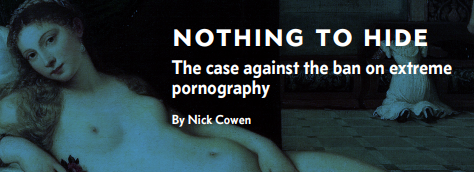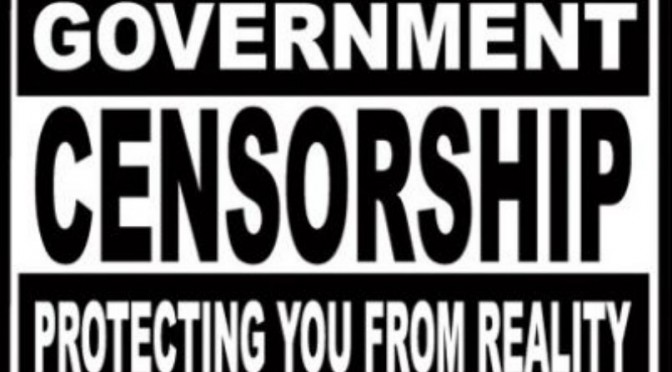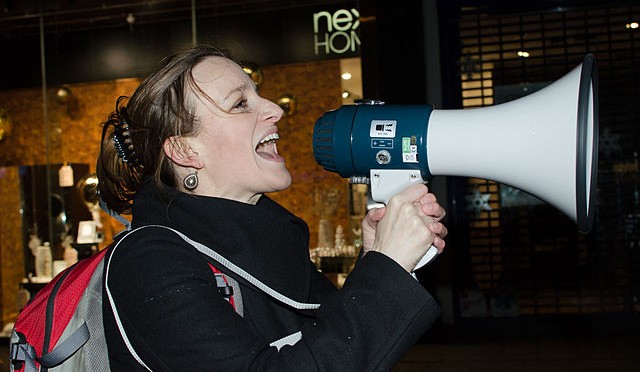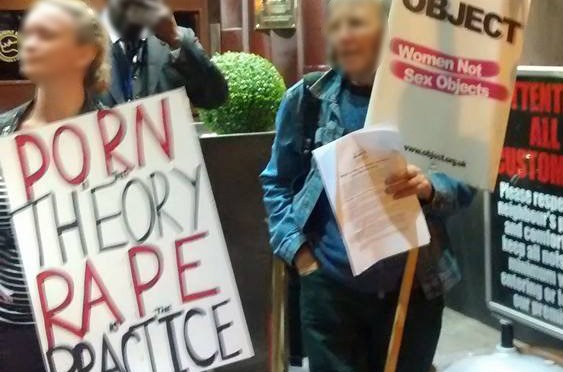This blog recently published a paper by Nick Cowen on the UK’s extreme porn law. This paper now forms the basis of a briefing from the Adam Smith Institute (ASI), which is available here.
As someone who, until recently, considered myself left-wing, I am ever bewildered and anguished by the fact that the defence of individual liberty, once a cornerstone of the left, is now the preserve of the free-market right: the Adam Smith Institute being a good example. Meanwhile, the left has become increasingly intolerant to free expression in many forms, of which porn is merely the most obvious: I document this strange reversal in political polarities in my book Porn Panic.
The word “extreme” in “extreme porn law” refers to the porn, though may be better used to describe the law. The law is odd for at least two reasons: first that it outlaws the depiction of acts that are popular between consenting couples; second that it targets the consumer rather than the producer.
The first aspect is strange: numerous acts such as whipping and fisting are perfectly legal to do in the privacy of one’s own bedroom. Yet the moment they are recorded, the video becomes illegal to possess.
The second aspect is dangerous: millions of people (including, probably, you) have broken the law and risk being imprisoned and listed as sex offenders. If you have looked at porn without using your browser’s incognito mode, your browser cache will be full of images from the pages you looked at. To merely have an “extreme” image on one’s phone or PC, or stored somewhere in a cloud email or storage account that you own, makes you a possessor of extreme porn. And who knows what constitutes extreme? Nick Cowen does, I do, and possibly a couple of thousand other people in the UK. To create a law that most people will never understand, yet carries heavy penalties, is draconian.
The law originated with a moral panic following the killing of a teacher, Jane Longhurst, by a man who had an interest in BDSM pornography. Clearly, nobody had explained to the government that correlation does not equate to causation: that the fact that a violent person might watch violent porn doesn’t mean that porn causes violence.
The Home Secretary who signed the law into force was Jacqui Smith; yet when I interviewed her, she was unaware of the law’s detail, or of its consequences (over a thousand people a year are now arrested for possessing extreme porn). To find that such a dangerous and unnecessary law could come into being without any serious political opposition or thought was a depressing realisation as to the nature of politics.
Nick’s ASI paper is worth reading; for those short on time, here is its executive summary:
- The ban on possession of ‘extreme pornography’ was introduced in 2009 and extended in 2015. The law, as drafted, bans depictions of some sex acts that can be conducted safely and consensually between adults, with a specific risk of prosecution posed to LGBT minorities.
- The Crown Prosecution Service reports more than a thousand offences prosecuted each year, implying significant enforcement costs that could be deployed effectively elsewhere.
- A significant minority of the British population enjoy sexually aggressive fantasy scenarios but do not pose a specific risk of committing violent or sexual offences.
- Access to pornography has increased dramatically in recent years, yet social harms imputed to pornography (especially violence against women) have reduced moderately but significantly.
- While some survey evidence claims a correlation between individual use of pornography and sexual aggression, econometric evidence suggests this is not a causal relationship and that, if anything, increased access to pornography can reduce measurable social harms.
- The ban itself represents a potential risk to political integrity. Like the ban on homosexuality in much of the 20th century, prohibitions on private sexual conduct can be used to silence, blackmail and corrupt individuals in positions of authority and responsibility.
- There are better policies for reducing violence against women in the dimensions of criminal justice, education and economic reform.
- The prevailing free speech doctrine in the United States shows that it is realistically possible to simultaneously tackle damaging forms of expression and maintain strong protections for innocuous forms






